Firm Dynamics and Employment Outcomes
In a market economy, firm foundations and closures are important drivers of resource (re)allocation, structural change, and economic development which is particularly important with respect to the economic transformation of East Germany from a state-directed to a market economy. At the same time, job displacement coming along with structural change may have serious consequences for affected employees, such as unemployment, earnings losses, or lower job quality in a new job. This research group uses microeconometric methods to analyze foundation, evolution, and failure of firms, the amount and quality of jobs created by new firms and the consequences of firm closures for employees, in particular in terms of labor market outcomes such as employment and wages.
Research Cluster
Productivity and InstitutionsYour contact

Mitglied - Department Structural Change and Productivity
EXTERNAL FUNDING
01.2020 ‐ 06.2024
The Rise of Populist Parties in Europe: The Dark Side of Globalization and Technological Change?
VolkswagenStiftung
Globalisation may have increased prosperity in general, but has also led to unemployment, wage inequality, outward migration and, thus, ageing populations in many European regions. This project examines whether these economic burdens lead to votes for populist parties.
01.2019 ‐ 06.2022
MICROPROD („Raising EU Productivity: Lessons from Improved Micro Data“)
European Commission
The goal of MICROPROD is to contribute to a greater understanding of the challenges brought about in Europe by the fourth industrial revolution and the associated ‘productivity puzzle’ in a context of globalisation and digitisation, and to provide alternative policy options to better address these challenges.
This project has received funding from the European Union’s Horizon 2020 research and innovation programme under grant agreement No 764810.
07.2018 ‐ 12.2020
Firm Wage Differentials in Imperfect Labour Markets: The Role of Market Power and Industrial Relations in Rent Splitting between Workers and Firms
German Research Foundation (DFG)
The main purpose of this proposal is to grasp a firmer understanding of how employment rents are split between workers and employers in imperfect labour markets and how labour market institutions, such as unions and works councils, influence the distribution of rents. In that it not only promises new insights into the wage formation process and the likely consequences of important labour market trends like falling unionisation and worker codetermination, but also promises to inform important public policy debates, such as which rights should be granted to organised labour.
02.2019 ‐ 09.2019
Evaluation of the IAB Establishment Panel 2018 and Preparation of a Results Report for West and East Germany
Final report: Fehlende Fachkräfte in Deutschland – Unterschiede in den Betrieben und mögliche Erklärungsfaktoren: Ergebnisse aus dem IAB-Betriebspanel 2018. IAB-Forschungsbericht 10/2019. (in German, English abstract available)
04.2016 ‐ 03.2019
Wage and Employment Effects of Bankruptcies
German Research Foundation (DFG)
The project analyzes the process and the consequences of firm failure. For the first time, evidence on the consequences of small firms’ bankruptcy on employees’ earnings and wages is provided. The project e.g. shows that employees of small firms are more likely to see their employer failing but, at the same time, face smaller earnings and wage losses than employees displaced from larger firms. Check the below research articles for further insights.
01.2018 ‐ 12.2018
Evaluation of the IAB Establishment Panel 2017 and Preparation of a Results Report for West and East Germany
Final report: Lohnunterschiede zwischen Betrieben in Ost- und Westdeutschland: Ausmaß und mögliche Erklärungsfaktoren. Ergebnisse aus dem IAB-Betriebspanel 2017. IAB-Forschungsbericht 6/2018. (in German, English abstract available)
01.2017 ‐ 09.2017
Evaluation of the IAB Establishment Panel 2016 and Preparation of a Results Report for West and East Germany
Final report: Produktivitätsunterschiede zwischen West- und Ostdeutschland und mögliche Erklärungsfaktoren. Ergebnisse aus dem IAB-Betriebspanel 2016. IAB-Forschungsbericht 16/2017. (in German, English abstract available)
Refereed Publications
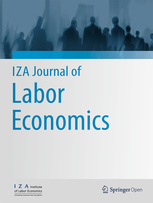
The Levelling Effect of Product Market Competition on Gender Wage Discrimination
in: IZA Journal of Labor Economics, No. 19, 2014
Abstract
Using linked employer–employee panel data for West Germany that include direct information on the competition faced by plants, we investigate the effect of product market competition on the gender pay gap. Controlling for match fixed effects, we find that intensified competition significantly lowers the unexplained gap in plants with neither collective agreements nor a works council. Conversely, there is no effect in plants with these types of worker codetermination, which are unlikely to have enough discretion to adjust wages in the short run. We also document a larger competition effect in plants with few females in their workforces. Our findings are in line with Beckerian taste-based employer wage discrimination that is limited by competitive forces.
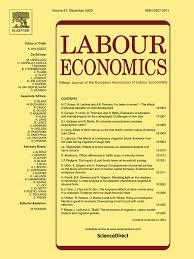
Do Better Pre-migration Skills Accelerate Immigrants' Wage Assimilation?
in: Labour Economics, 2014
Abstract
This paper analyzes wage assimilation of ethnic German immigrants to Germany using unique administrative data that include an administrative estimate of immigrants' expected wage in Germany at the time of migration. We find that a 10% higher wage potential translates into a 1.6% higher wage in Germany when also controlling for educational attainment, thus pointing at partial transferability of pre-migration skills to the host country's labor market. We also document that wage assimilation is significantly accelerated for immigrants with higher wage potentials. Our results are both in line with complementarities between pre-migration skills and host country-specific human capital and a U-shaped pattern of immigrants' job mobility with initial downgrading and subsequent upgrading.
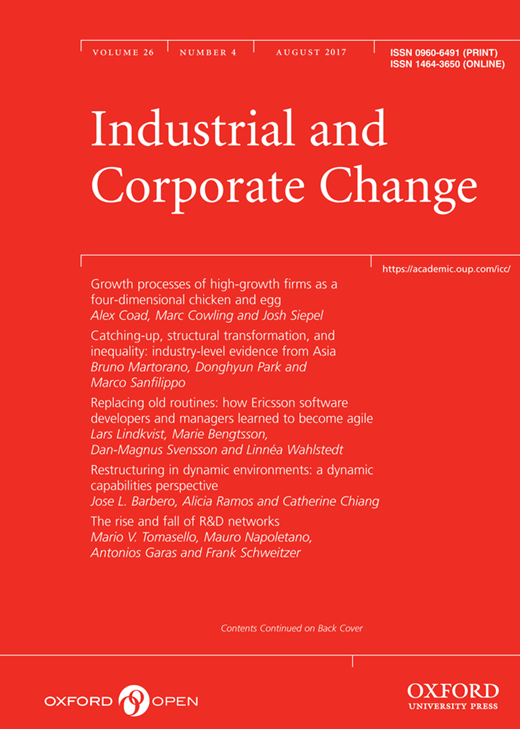
Lingering Illness or Sudden Death? Pre-exit Employment Developments in German Establishments
in: Industrial and Corporate Change, No. 4, 2014
Abstract
Using a large administrative data set for Germany, this article compares employment developments in exiting and surviving establishments. Applying a matching approach, we find a clear “shadow of death” effect reflecting lingering illness: in both West and East Germany establishments shrink dramatically already several years before closure, employment growth rates differ strongly between exiting and surviving establishments, and this difference becomes stronger as exit approaches. Moreover, we provide first evidence that prior to exit the workforce becomes on average more skilled, more female, and older in exiting compared to surviving establishments. These effects are more clearly visible in West than in East Germany.
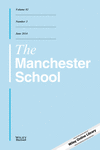
What Can We Learn from Bargaining Models about Union Power? The Decline in Union Power in Germany, 1992–2009
in: Manchester School, No. 3, 2014
Abstract
Building on the right-to-manage model of collective bargaining, this paper tries to infer union power from the observed results in wage setting. It derives a time-varying indicator of union strength taking account of taxation, unemployment benefits, and the labour market situation and confronts this indicator with annual data for Germany. The results show that union power did not change much from 1992 to 2002 but fell markedly (by about one-third) from 2002 to 2007 in the aftermath of substantial labour market reforms.
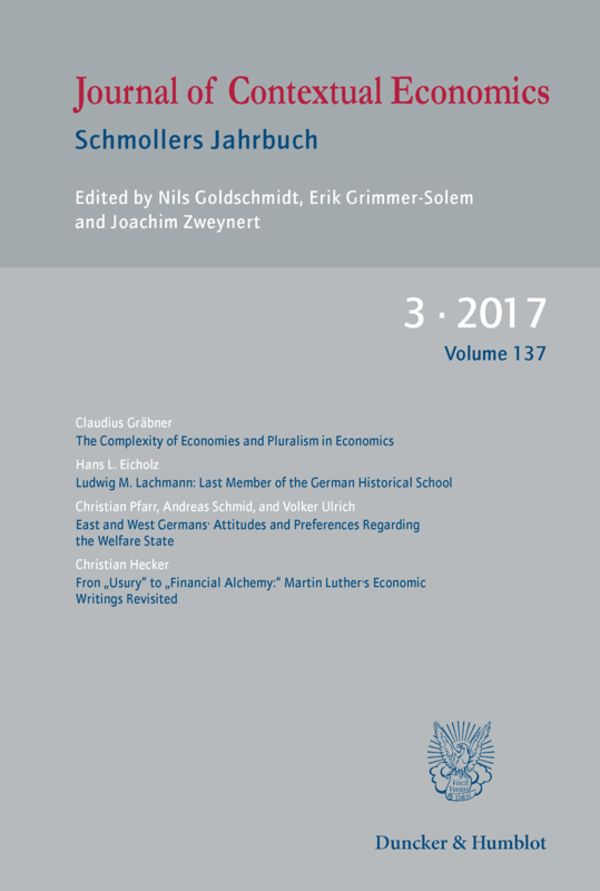
Establishment Survival in East and West Germany: A Comparative Analysis
in: Schmollers Jahrbuch, No. 2, 2014
Abstract
Using a large administrative dataset, this paper compares the development of new establishments’ survival chances in East and West Germany for the period 1994 – 2008. A central question is whether convergence with respect to survival rates between East and West Germany can be observed. Using methods of survival analysis, I find that new establishments’ survival chances do not differ strongly between East and West Germany at the beginning of the observation period. In 1998 and 1999 the exit hazard increases strongly in East but not in West Germany, which is likely to be due to a change in the subsidy policy affecting East Germany. Since the turn of the millennium, the difference in establishments’ exit hazard between East and West Germany becomes smaller, indicating that there is convergence with respect to establishments’ survival chances.
Working Papers
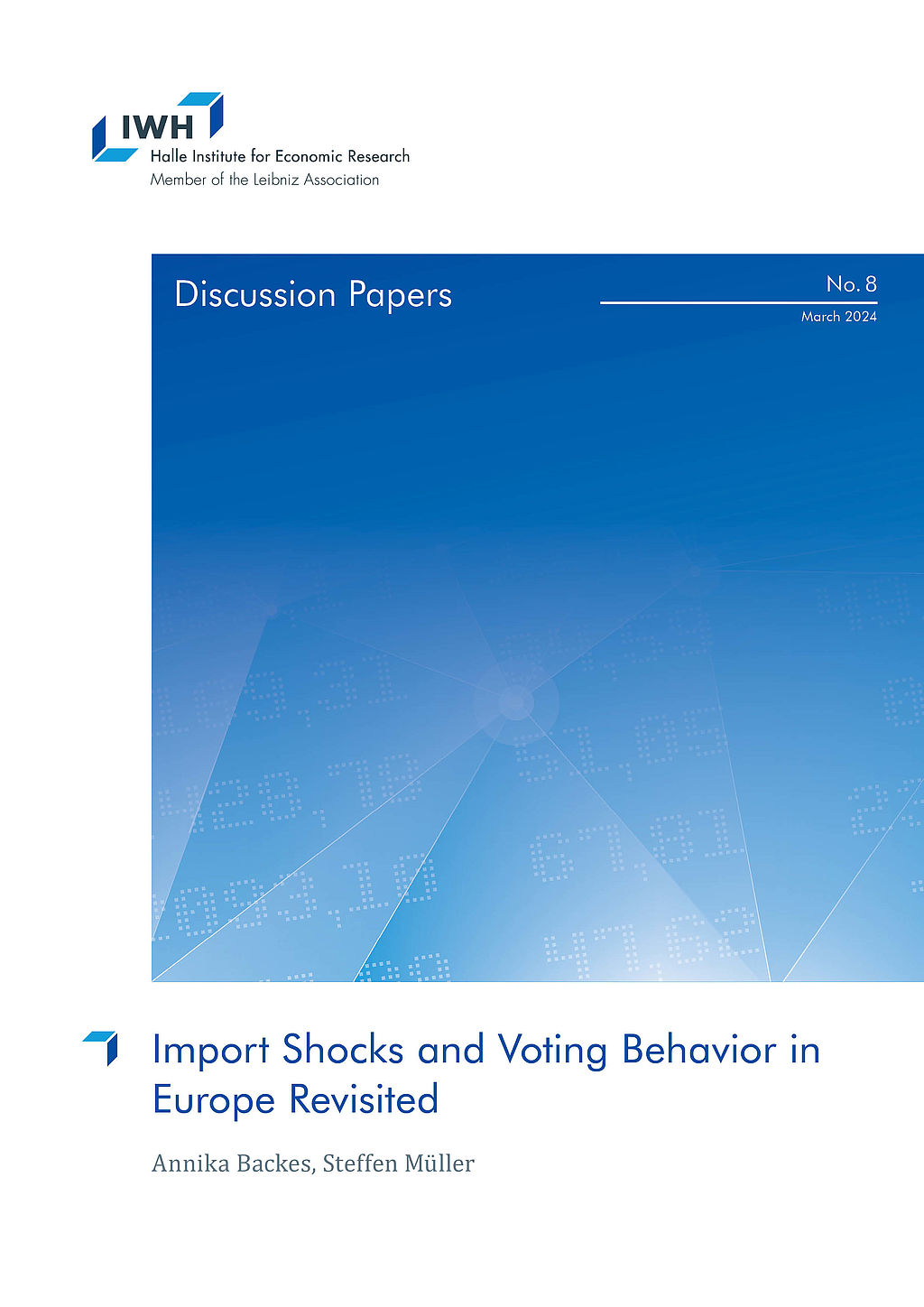
Import Shocks and Voting Behavior in Europe Revisited
in: IWH Discussion Papers, No. 8, 2024
Abstract
We provide first evidence for the long-run causal impact that Chinese imports to European regions had on voting outcomes and revisit earlier estimates of the short-run impact for a methodological reason. The fringes of the political spectrum gained ground many years after the China shock plateaued and, unlike an earlier study by Colantone and Stanig (2018b), we do not find any robust evidence for a short-run effect on far-right votes. Instead, far-left and populist parties gained in the short run. We identify persistent long-run effects of import shocks on voting. These effects are biased towards populism and, to a lesser extent, to the far-right.
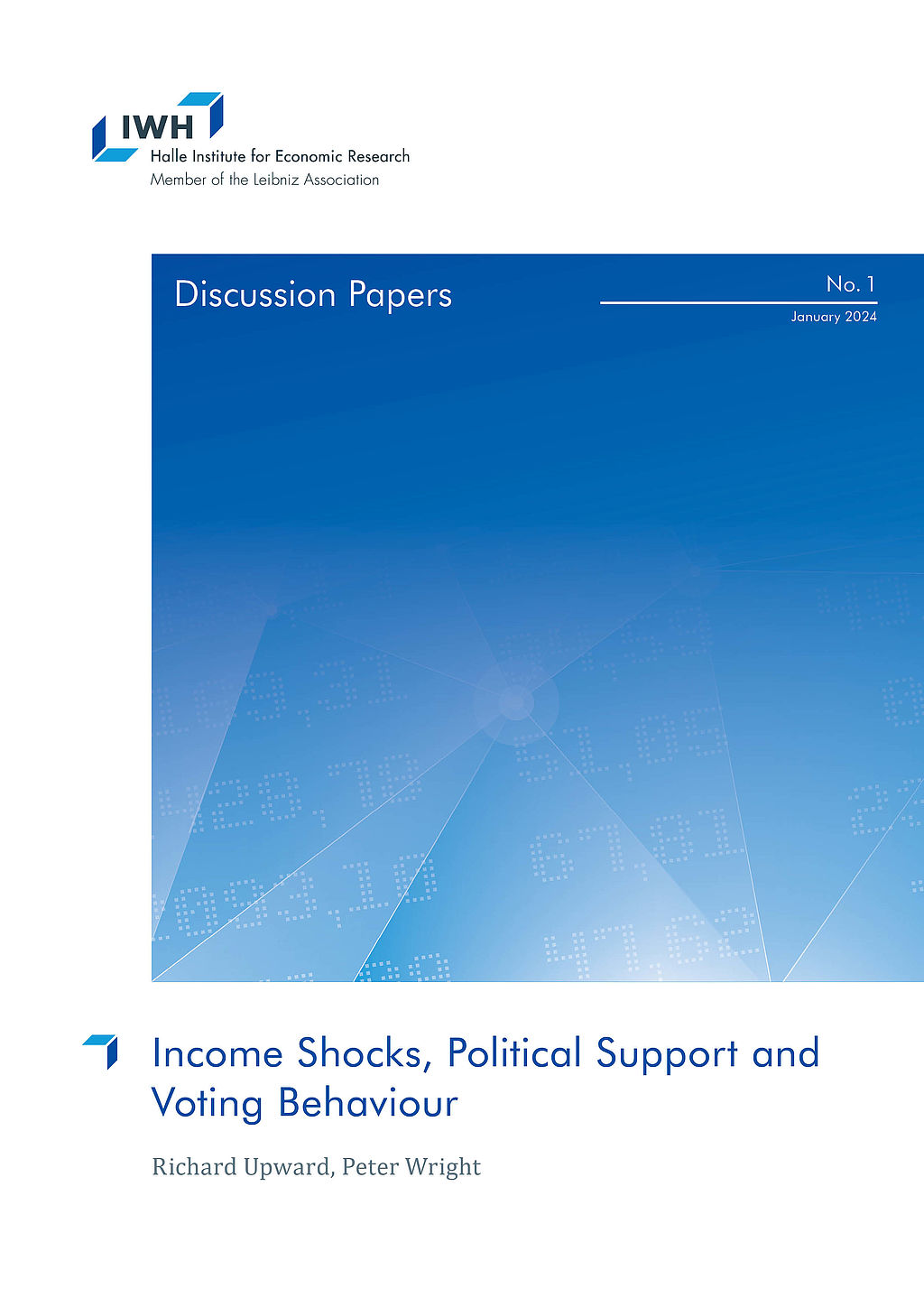
Income Shocks, Political Support and Voting Behaviour
in: IWH Discussion Papers, No. 1, 2024
Abstract
We provide new evidence on the effects of economic shocks on political support, voting behaviour and political opinions over the last 25 years. We exploit a sudden, large and long-lasting shock in the form of job loss and trace out its impact on individual political outcomes for up to 10 years after the event. The availability of detailed information on households before and after the job loss event allows us to reweight a comparison group to closely mimic the job losers in terms of their observable characteristics, pre-existing political support and voting behaviour. We find consistent, long-lasting but quantitatively small effects on support and votes for the incumbent party, and short-lived effects on political engagement. We find limited impact on the support for fringe or populist parties. In the context of Brexit, opposition to the EU was much higher amongst those who lost their jobs, but this was largely due to pre-existing differences which were not exacerbated by the job loss event itself.
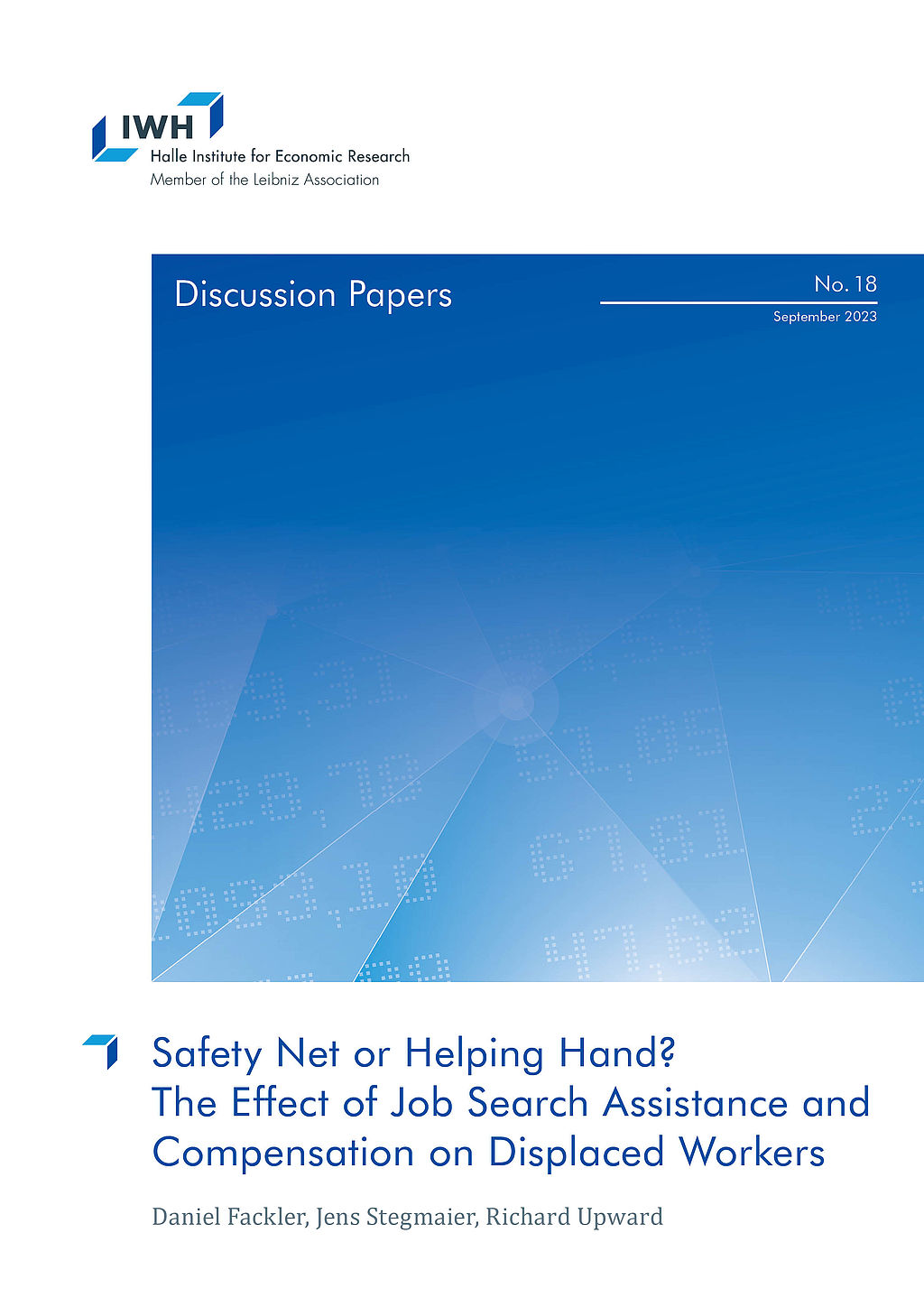
Safety Net or Helping Hand? The Effect of Job Search Assistance and Compensation on Displaced Workers
in: IWH Discussion Papers, No. 18, 2023
Abstract
We provide the first systematic evidence on the effectiveness of a contested policy in Germany to help displaced workers. So-called “transfer companies” (<i>Transfergesellschaften</i>) employ displaced workers for a fixed period, during which time workers are provided with job-search assistance and are paid a wage which is a substantial fraction of their pre-displacement wage. Using rich and accurate data on workers’ employment patterns before and after displacement, we compare the earnings and employment outcomes of displaced workers who entered transfer companies with those that did not. Workers can choose whether or not to accept a position in a transfer company, and therefore we use the availability of a transfer company at the establishment level as an IV in a model of one-sided compliance. Using an event study, we find that workers who enter a transfer company have significantly worse post-displacement outcomes, but we show that this is likely to be the result of negative selection: workers who lack good outside opportunities are more likely to choose to enter the transfer company. In contrast, ITT and IV estimates indicate that the use of a transfer company has a positive and significant effect on employment rates five years after job loss, but no significant effect on earnings. In addition, the transfer company provides significant additional compensation to displaced workers in the first 12 months after job loss.
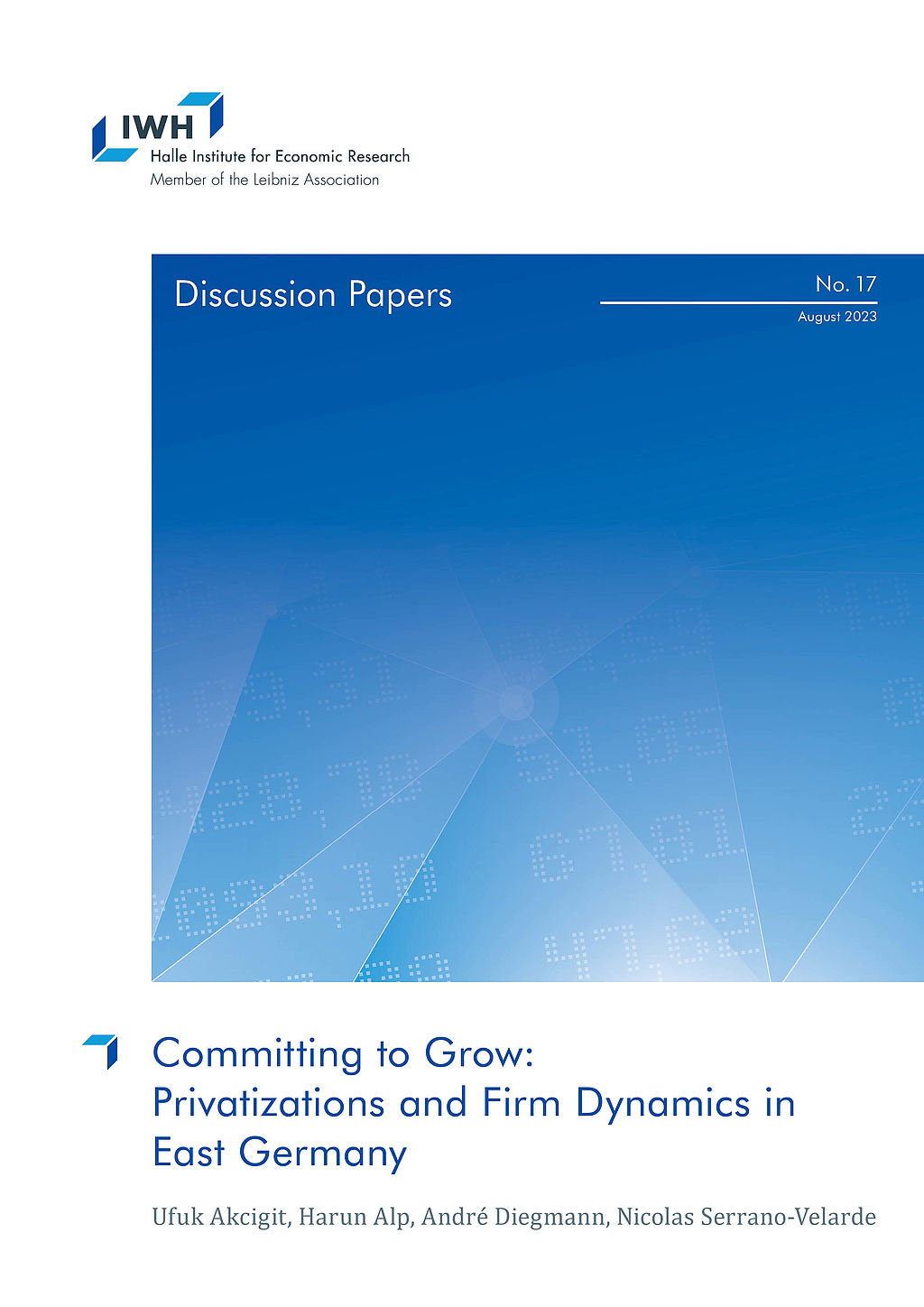
Committing to Grow: Privatizations and Firm Dynamics in East Germany
in: IWH Discussion Papers, No. 17, 2023
Abstract
This paper investigates a unique policy designed to maintain employment during the privatization of East German firms after the fall of the Iron Curtain. The policy required new owners of the firms to commit to employment targets, with penalties for non-compliance. Using a dynamic model, we highlight three channels through which employment targets impact firms: distorted employment decisions, increased productivity, and higher exit rates. Our empirical analysis, using a novel dataset and instrumental variable approach, confirms these findings. We estimate a 22% points higher annual employment growth rate, a 14% points higher annual productivity growth, and a 3.6% points higher probability of exit for firms with binding employment targets. Our calibrated model further demonstrates that without these targets, aggregate employment would have been 15% lower after 10 years. Additionally, an alternative policy of productivity investment subsidies proved costly and less effective in the short term.
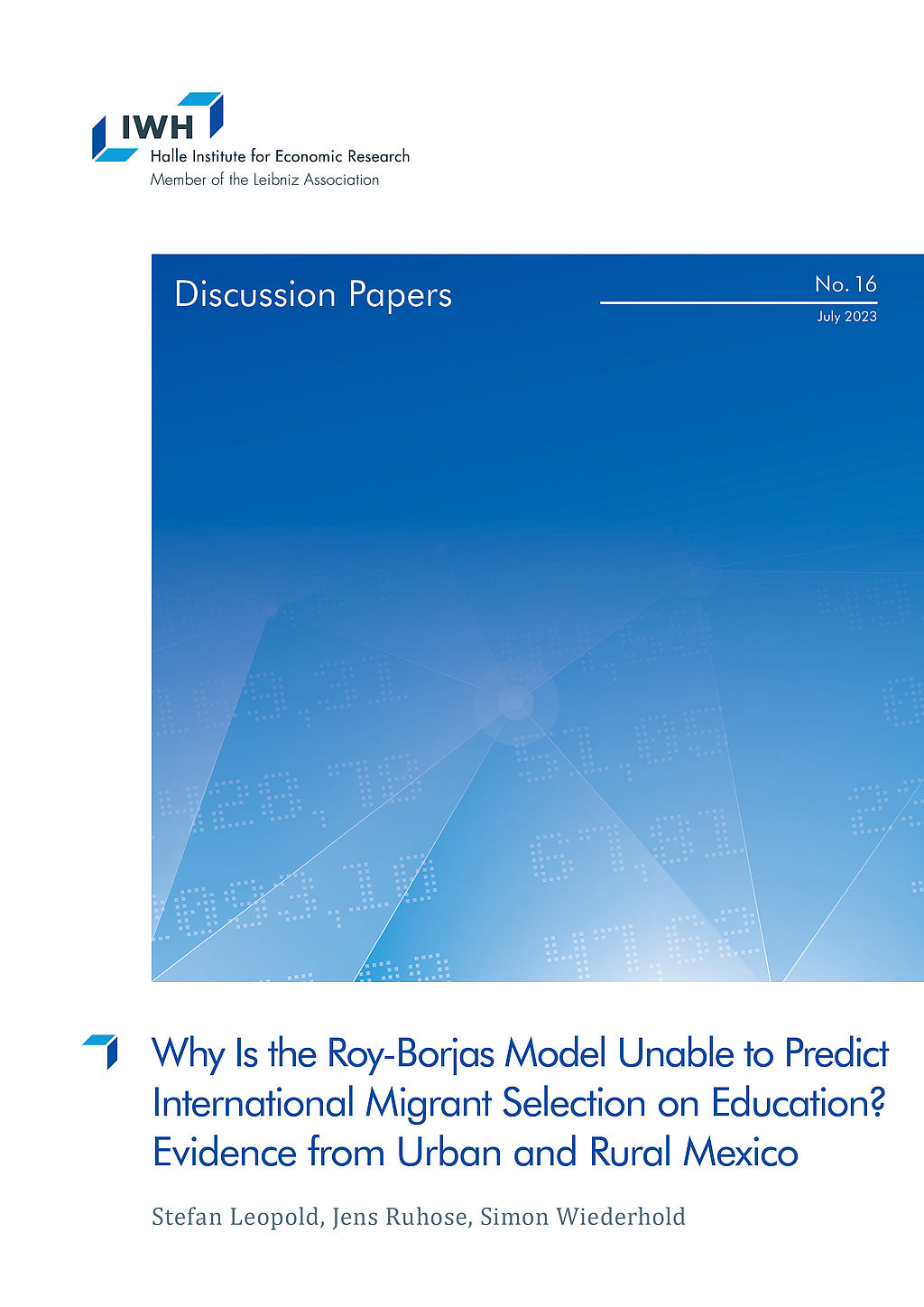
Why Is the Roy-Borjas Model Unable to Predict International Migrant Selection on Education? Evidence from Urban and Rural Mexico
in: IWH Discussion Papers, No. 16, 2023
Abstract
The Roy-Borjas model predicts that international migrants are less educated than nonmigrants because the returns to education are generally higher in developing (migrant-sending) than in developed (migrant-receiving) countries. However, empirical evidence often shows the opposite. Using the case of Mexico-U.S. migration, we show that this inconsistency between predictions and empirical evidence can be resolved when the human capital of migrants is assessed using a two-dimensional measure of occupational skills rather than by educational attainment. Thus, focusing on a single skill dimension when investigating migrant selection can lead to misleading conclusions about the underlying economic incentives and behavioral models of migration.


















